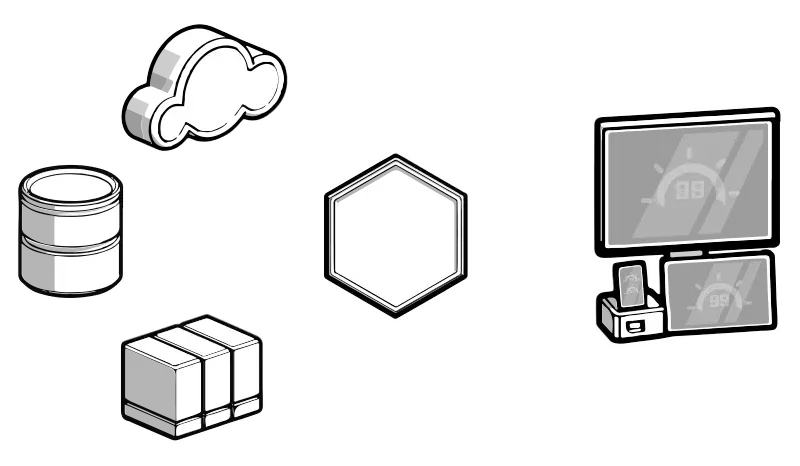Add Real Time and Historical Alarms to Your Windows Apps
OAS Alarm .NET brings live alarm tracking and history display to your custom Windows apps. You can use it with new builds in Visual Studio or drop it into existing projects for added visibility and control.
This tool supports full .NET alarm visualization and .NET alarm management, making it easy to respond to alerts quickly and efficiently. With built-in IIoT .NET alarms support, your data stays connected to the real world, and all alarm activity can be logged to databases such as MS SQL Server, Oracle, mySQL, postreSQL, and more.
Both WinForm industrial application alarm and WPF industrial application alarm designs are supported, giving you flexibility based on how your app is built.
a server-based, highly-scalable, network platform that enables the transport and transformation of your data
Data HistorianAchieve fault-tolerant logging, zero data loss, and multi-destination storage with our high-performance Store and Forward technology.
Visualization ToolsBuild Visualizations, User Interfaces, and server configuration interfaces for .NET, web technologies, native iOS and Android mobile apps
Device & Data ConnectorsThe OAS Platform provides rapid communications and connectivity to a wide variety of PLCs, devices, and databases.
IoT ConnectorsConnect to cloud-base IoT gateways such as AWS, Azure IoT Hub, Azure Event Hubs, Kafka, and more.
Alarm Logging & NotificationCapture events on each data point, log to open formats for historical analysis and archiving, and trigger real time notifications
SDKs & APIsExplore a wide variety of Developer Tools and APIs to allow you to create applications and system integrations to execute in any environment.
Networking FeaturesOpen Automation Software implements edge computing with a Distributed Network Architecture.
Download a fully functional trial of Open Automation SoftwareKey Features & Benefits
Customizable Display
Alarm .NET is customizable so you can determine the color scheme used for tracking alarm statuses and type. You can also filter which alarms are loaded into the alarm viewer so operators can focus on the most important operational events. Associate documents with alarms for custom documentation, log operator comments, and more.
Visual Studio Support
Build and customize your alarm viewer within Visual Studio, utilizing the property panels to adjust all component settings. Additionally, you can programmatically configure and update Alarm .NET from .NET code.
Security
All client-server communication is encrypted using TCP, so your alarm data stays safe. You can pull alarms from local or remote OAS servers without compromising security.
Unlimited Clients
Deploy your application to unlimited clients without the need to add OAS licenses to each. OAS licensing is only required at the server level where data is collected. That means you can roll out your WinForm alarm or WPF alarm solution without any extra fees for end users.
Common Questions
Can the Alarm .NET Component be customized?
Yes, the component can be configured to display only the alarms you choose to display along with specific data points for each, such as the Alarm timestamp, value that triggered the alarm, priority, alarm time, and more.
What interactive features are included?
Operators can acknowledge alarms, sort or search active and historical alarms, and even export data. It’s designed to support hands-on .NET alarm management.
Can the Alarm .NET Component be used in any .NET project?
Yes, the component fits into any Windows desktop layout. It works great in both WinForm and WPF alarm setups and can be fully managed from your .NET code.
Learn how thousands of customers are using the OAS Product Platform around the globe to achieve truly open industrial automation
24/7/365
Support
Technical support available by phone, chat, and email
30+ Years
Experience
Product efficacy, market testing, and reliability
Used in 10K+
Data Servers
OAS is used in thousands of businesses worldwide
OAS Platform Features
Cross-Platform Support
The OAS Platform supports multiple operating systems and deployment options including Windows, Linux, Docker Containers, and can even run on low footprint devices such as a Raspberry PI 4.
Networking
OAS is an edge solution that offers flexible networking options for standalone installations, multi-tenant data aggregation, and even secure unidirectional data transport.
Programmatic Setup
Utilize our .NET SDK or REST API for flexible and automated setup, ensuring full integration with your asset management software. You can also import and export CSV files, which helps you work with Excel and third-party applications.
Calculations, Time On, Counts, and Totals
Merge data from various controllers and additional data sources while performing real-time computations and logic processing, all without the need for coding. Monitor the duration of activities for specific points and the frequency of their transitions over a defined period. Aggregate analog values both daily and over the entire timeline.
See How We Compare
The initial cost of OAS is far less than our competitors – but the savings don’t stop there. We work with OEMS and System Integrators to provide perpetual licenses with quantity discounts with flexible tag pricing and unlimited client connections.
No Question Left Unanswered
We make getting started with OAS easy - Browse our extensive Knowledge Base of articles on Getting Started as well as How To content that takes you step-by-step through building a solution, and finally learn more about specific features and configurations.
Getting Started - Download, Setup & Support
Step-by-step introduction to using the Open Automation Software platform
How to manually add and define Tags using the Configure OAS application.
Familiarize yourself with the following steps to setup the Alarm .NET Component.
Learn the basics of setting up Alarm conditions on OAS Tags.
Learn how OAS support alarm logging to local and remote databases.
More about the 3 key networking methods included with licenses.
How to quickly access options and make custom changes.
How to active and manage OAS license.





